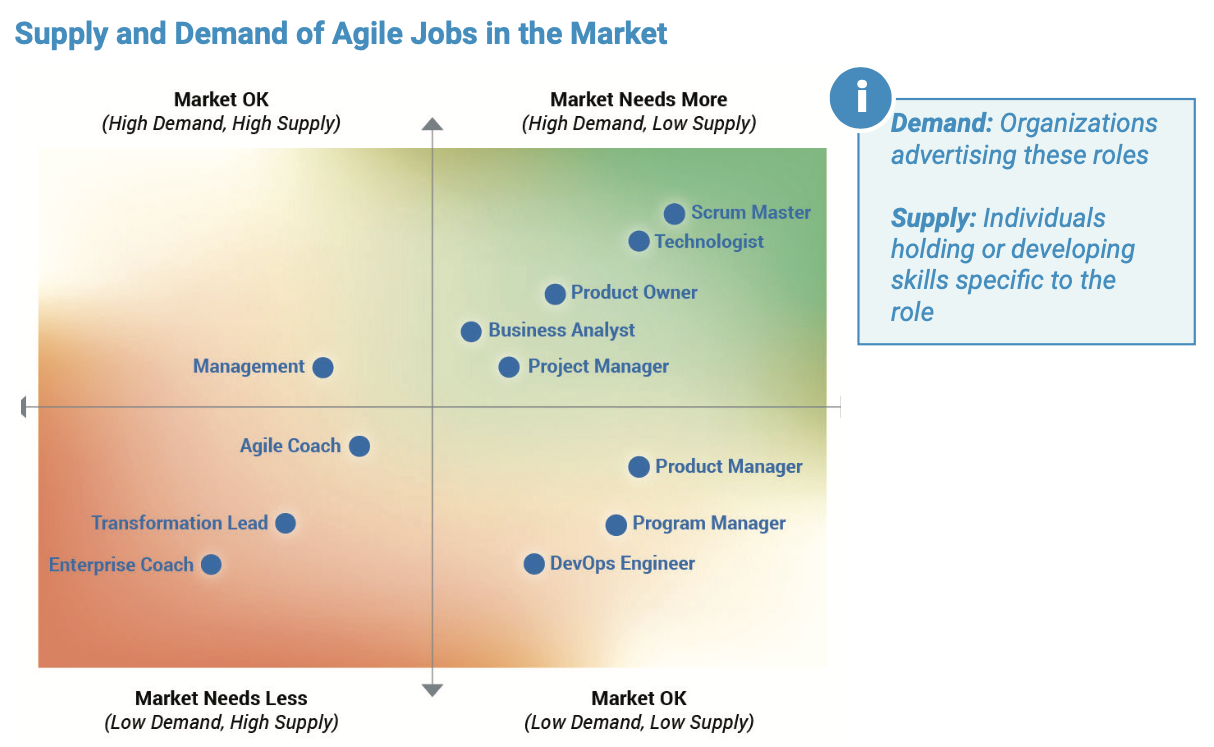Learn about purchasing for teams
Enhancing Your Skills: Tips for Agile Coaches and Trainers

The demand for agile coaching as a dedicated role is low, according to the "Skills in the New World of Work" report. Only 18% of respondents were looking for agile coaches. This is not to say that employers aren't looking for adept agilists; quite the opposite: agile acumen is the 2nd-most demanded skill according to the report.

Source: "Skills in the New World of Work" report
Where Do We, as Agile Coaches, Go From Here?
Recently there was a major reorganization at my company. Shortly thereafter, one of my new bosses proudly proclaimed, “We are all coaches.” This statement was undeniably clear. In this new organization, coaching by experienced professionals was no longer valued. Adding to this shocking discovery, a proposed mission-critical training course was rejected. The reasoning behind this was, “We’ve had enough training, and we’re not sure how much value it had.” My role as Agile Coach and Trainer was both not appreciated and in jeopardy.
If businesses and those in leadership truly believe they no longer need dedicated agile coaches and training is something they can do without, the obvious question we face is: what’s next? The way I see it, we could take one of two directions. The first is to throw in the towel and consider a complete career change to less volatile fields, like becoming a plumber or electrician’s assistant. The second is to dig deep and discover how to augment our already vast skill set.
Basically, we are faced with the same challenge as most product owners. That is, how do we create value that helps our organizations thrive? In previous adaption phases, value was predefined through the frameworks we studiously embraced and applied. Now, we must venture beyond these predefined parameters into the uncertain world of “plan, do, check, act."
New Avenues for Agile Coaches to Create and Increase Value
Here are five ideas that may help get you started:
- Improve your communication skills. You may believe you’re already a good communicator; well, think again. There are always ways to improve. If you can’t think of anything, ask those you work with.
- Dust off those SQL skills or revive that QA management passion. Running a query on production bugs, I discovered a common theme. This enabled me to ask the team informed discovery questions. From these conversations, an understanding of the problem grew, and a solution emerged that they could own.
- Improve your problem-solving and critical thinking skills. This is where I enjoy employing system thinking. When I hit a snag, I often create a Causal Loop Diagram from my LeSS toolkit. Returning to our bug problem: Based on the team’s input, I mapped out the system that created these issues. This convincing view led the vice president of our group to add an additional team whose focus is on creating and maintaining automated tests.
- How about your teamwork and collaboration skills? Do you really care about what your team thinks about you or your performance? If you’re unsure, ask them to undertake a scrum master assessment. There are plenty of these online. I created one by developing assessment questions based on the scrum master role as defined by the Scrum Guide. Believe me, this uncovers a lot.
- How well do you understand the business you support? This was a hard one for me. I worked hard to ensure my teams understood the frameworks they adapted and were consistently improving. I thought I was contributing sufficient value to the team until I underwent one of those scrum master assessments I spoke of earlier. My teams insisted that I have far more than a superficial understanding of our business. Taking this to heart, I took advantage of the training my organization offers. I listened in on a customer support call. I continue to make sure I ask questions when I don’t understand something. I also ensure I understand both the up and downstream processes my teams support.
According to the “Skills in the New World of Work” report, agile has become the established—and expected—way of working on tech and product teams across millions of organizations globally. So agile has basically won, now what? The answer may look vastly different for each of us. But I am convinced if we want to continue to be change agents, we must dig deeper and expand wider.
Thriving in the Agile Era: Download the "Skills in the New World of Work" Report
For more valuable insights into the skills employers are looking for and how you can increase your desirability as a job candidate, complete the form below and get access to the report now.











